

Untitled. The known: Overdiagnosis of some common cancers is a problem in developed countries, including Australia.
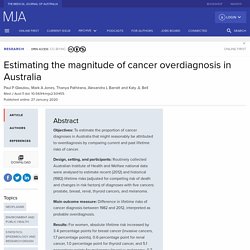
The new: After analysing changes in absolute lifetime risks for prostate, breast, renal, thyroid cancers and melanoma between 1982 and 2012, we estimated that 18% of all cancers diagnosed in women (ie, 11 000 diagnoses each year), and 24% of those in men (18 000 each year) are overdiagnosed cancers. The implications: Cancer overdiagnosis is a substantial problem that urgently requires changes in public health policy. The burden of cancer is increasing rapidly,1 including in Australia,2 partly because of ageing populations, reduced competing mortality from cardiovascular disease, and changes in exposure to risk factors for cancer. 7. Marmot MG, Altman DG, Cameron DA, et al. 6. 5. 4. 3. 2. 1.
Cancer can also be overdiagnosed outside screening programs. 10. 9. 8. 13. 12. 11. Methods 15. Excess lifetime risk for five cancers with recognised overdiagnosis potential 17. 19. 18. 20. 21. 22. The Cancer Industry: Hype vs. Reality. Today I’m giving a talk at my school, Stevens Institute of Technology, titled “The Cancer Industry: Hype Versus Reality.”
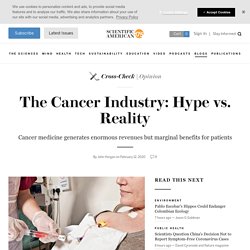
The talk focuses on the enormous gap between the grim reality of cancer medicine in the U.S. and the upbeat claims made by the cancer industry and its media enablers. Below are points I plan to make in my talk, which expand upon ones I’ve made in previous posts. —John Horgan First, some basic facts to convey the scale of the problem. Cancer is the second most lethal disease in the U.S., behind only heart disease. Research funding has also surged. Do doctors who order more routine medical tests diagnose more cancers? A population‐based study from Ontario Canada. Finding the Right Words to Stop Cancer Screening in Older Adults. During her geriatric medicine fellowship in 2012, Nancy Schoenborn, MD, took notice of the American Geriatrics Society’s new guideline on caring for older adults with multimorbidity.
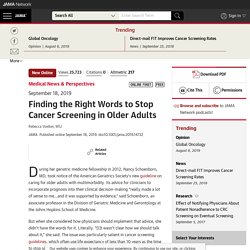
Its advice for clinicians to incorporate prognosis into their clinical decision-making “really made a lot of sense to me…and it was supported by evidence,” said Schoenborn, an associate professor in the Division of Geriatric Medicine and Gerontology at the Johns Hopkins School of Medicine. But when she considered how physicians should implement that advice, she didn’t have the words for it. Literally. “[I]t wasn’t clear how we should talk about it,” she said. The issue was particularly salient in cancer screening guidelines, which often use life expectancy of less than 10 years as the time to stop screening. “If they pointed to the [guideline] and said, ‘Look, it says don’t screen if you have less than 10 years to live,’…that’s not going to go over very well,” she said.
Between a Rock and the Guidelines. Performance of Screening Ultrasonography as an Adjunct to Screening Mammography in Women Across the Spectrum of Breast Cancer Risk. - PubMed - NCBI. Cancer overdiagnosis: a biological challenge and clinical dilemma. Jamanetwork. Question Is intensive follow-up of patients after curative surgery for colorectal cancer effective in reducing mortality?
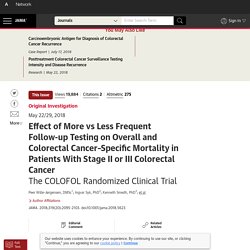
Findings In this randomized clinical trial that included 2509 patients with stage II or III colorectal cancer, follow-up testing with computed tomography and serum carcinoembryonic antigen on 5 vs 2 occasions did not result in a significant difference in the 5-year overall mortality rate (13.0% vs 14.1%, respectively) or colorectal cancer–specific mortality rate (10.6% vs 11.4%). Meaning Among patients with stage II or III colorectal cancer, increased frequency of follow-up testing did not reduce the 5-year mortality rate. Breast Biopsy Intensity and Findings Following Breast Cancer Screening in Women With and Without a Personal History of Breast Cancer. - PubMed - NCBI.
Report: Doctors Overdiagnose Thyroid Cancer 80 Percent of Time. Targeted breast screening could reduce overdiagnosis and be more cost effective, study finds. Digital Rectal Examination for Prostate Cancer Screening in Primary Care: A Systematic Review and Meta-Analysis. - PubMed - NCBI. Margaret McCartney: Can we now talk openly about the risks of screening? Effect of a Low-Intensity PSA-Based Screening Intervention on Prostate Cancer Mortality: The CAP Randomized Clinical Trial. - PubMed - NCBI.
Medication overuse in oncology: current trends and future implications for patients and society - The Lancet Oncology. Digital rectal exams to screen for prostate cancer in family practice not recommended - Health. Men don't need to receive routine digital rectal exams to screen for prostate cancer from their family doctors, a new review of the medical evidence suggests.
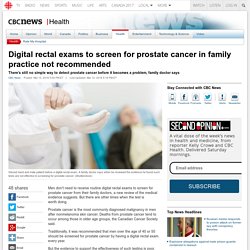
But there are other times when the test is worth doing. Prostate cancer is the most commonly diagnosed malignancy in men after nonmelanoma skin cancer. Deaths from prostate cancer tend to occur among those in older age groups, the Canadian Cancer Society said. Traditionally, it was recommended that men over the age of 40 or 50 should be screened for prostate cancer by having a digital rectal exam every year. But the evidence to support the effectiveness of such testing is poor, says a Canadian doctor who reviewed previous research on the topic involving more than 9,000 patients. While there was no strong evidence to recommend the routine use of digital rectal exams in screening for prostate cancer, the test is helpful for rectal bleeding, enlarged prostate, rectal masses and other situations, Profetto said.
"The answer is simple. Prostate cancer screening: massive study gets minimal coverage. Why? Posted By Michael Joyce is a writer-producer with HealthNewsReview.org and tweets as @mlmjoyce The largest-ever randomized trial of using the prostate-specific antigen (PSA) test in asymptomatic men over the age of 50 has found — after about 10 years of follow-up — no significant difference in prostate cancer deaths among men who were screened with a single (“one-off”) PSA test, and those who weren’t screened.
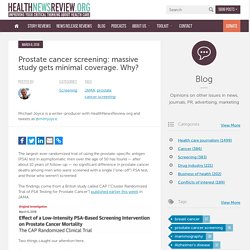
The findings come from a British study called CAP (“Cluster Randomized Trial of PSA Testing for Prostate Cancer”) published earlier this week in JAMA. Two things caught our attention here. First, that this “largest-ever” trial did not get large coverage in the mainstream press. Second, it reminded us that even when coverage of screening is actually large, it often falls short in two very important ways. Experience of US Patients Who Self-identify as Having an Overdiagnosed Thyroid Cancer: A Qualitative Analysis. - PubMed - NCBI. Consequences of False Positive Mammogram Results. Abolishing Mammography Screening Programs? A View from the Swiss Medical Board. Recent Publications - Wiser Healthcare. Primary goals, information-giving and men’s understanding: a qualitative study of Australian and UK doctors’ varied communication about PSA screening – Kristen Pickles et. al.
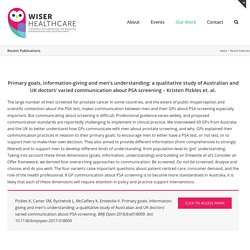
The large number of men screened for prostate cancer in some countries, and the extent of public misperception and scientific contention about the PSA test, makes communication between men and their GPs about PSA screening especially important. But communicating about screening is difficult. Professional guidance varies widely, and proposed communication standards are reportedly challenging to implement in clinical practice. We interviewed 69 GPs from Australia and the UK to better understand how GPs communicate with men about prostate screening, and why. GPs explained their communication practices in relation to their primary goals: to encourage men to either have a PSA test, or not test, or to support men to make their own decision. Click to access paper. The Barrier to Informed Choice in Cancer Screening: Statistical Illiteracy in Physicians and Patients. Chapter First Online: Part of the Recent Results in Cancer Research book series (RECENTCANCER, volume 210) Abstract An efficient health care requires both informed doctors and patients.
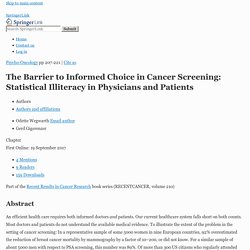
Our current healthcare system falls short on both counts. Keywords. Harms of cervical cancer screening in the United States and the Netherlands - Habbema - 2017 - International Journal of Cancer. We studied harms related to cervical cancer screening and management of screen-positive women in the United States (US) and the Netherlands.
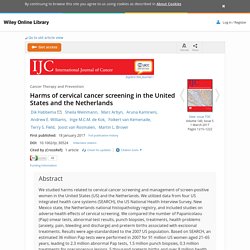
We utilized data from four US integrated health care systems (SEARCH), the US National Health Interview Survey, New Mexico state, the Netherlands national histopathology registry, and included studies on adverse health effects of cervical screening. We compared the number of Papanicolaou (Pap) smear tests, abnormal test results, punch biopsies, treatments, health problems (anxiety, pain, bleeding and discharge) and preterm births associated with excisional treatments.
Results were age-standardized to the 2007 US population. Based on SEARCH, an estimated 36 million Pap tests were performed in 2007 for 91 million US women aged 21–65 years, leading to 2.3 million abnormal Pap tests, 1.5 million punch biopsies, 0.3 million treatments for precancerous lesions, 5 thousand preterm births and over 8 million health problems. Breast cancer survival 'unaffected by faulty gene' Image copyright Getty Images Young breast cancer patients with faulty BRCA genes have the same survival chances as those without, a study has found.
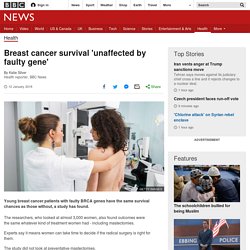
The researchers, who looked at almost 3,000 women, also found outcomes were the same whatever kind of treatment women had - including mastectomies. Experts say it means women can take time to decide if the radical surgery is right for them. The study did not look at preventative mastectomies. These are offered to women with faulty genes to cut their risk of developing cancer.
Scrutiny-Dependent Cancer. Experts: too much screening has misled us about cancer risk factors. He best-known downside of cancer screening, such as PSA tests for prostate cancer and mammograms for breast cancer, is that they often flag cancers that pose no risk, leading to overdiagnosis and unnecessary, even harmful, treatment. But widespread screening for “scrutiny-dependent” cancers — those for which the harder you look the more you find, and the more of what you find is harmless — causes another problem, two leading cancer experts argue in a paper published on Monday: increasing the apparent incidence of some cancers. That in turn is misleading doctors and the public about what increases people’s risk of developing cancers — or at least the types of cancer that matter. “Detecting cancers that would never become apparent is screwing up our understanding of risk factors,” said Dr. H. Too Many Older Patients Get Cancer Screenings. Nearly one in five women with severe cognitive impairment, including older patients like Elena Altemus, are still getting regular mammograms, according to the American Journal of Public Health, even though the procedure is not recommended for people with a limited life expectancy.
And 55 percent of older men with a high risk of death over the next decade still get PSA tests for prostate cancer. Among people in their 70s and 80s, cancer screenings often detect slow-growing tumors that are unlikely to cause problems in patients’ lifetimes. These patients often die of something else — from dementia to heart disease to pneumonia — long before their cancers would ever have become a threat, said Dr. The College of Family Physicians of Canada. Using disease-specific mortality in discussions with patients.
Older Adults' Views and Communication Preferences About Cancer Screening Cessation. All-Cause Mortality in Randomized Trials of Cancer Screening. An Error Occurred Setting Your User Cookie. The Truth about Mammograms — truTV.com. Cancer lingo: How one person's thoughtful metaphor can be another's cliché - Health. In her cozy Toronto home, Claire Edmonds strums a few strings on her guitar and slips into her relax mode. It's part of her therapy, helping her to maintain good mental health. Two years ago, a routine mammogram disrupted what was a peaceful life the 59-year-old shared with her husband and two daughters. The results of the test taken the day before revealed a suspicious tumour.
"I came home at nine o'clock that night. It was my birthday. The doctor had phoned: It was breast cancer. Fatigue of fighting What followed were several months of the standard treatment: Chemotherapy, radiation, surgery. We need an Overdiagnosis Awareness month. September was Prostate and Thyroid Cancer Awareness Month, October was Breast Cancer Awareness Month, and November was Lung Cancer Awareness Month. We should designate December as Cancer Overdiagnosis Awareness month, because a lot of cancers diagnosed by screening tests will never kill you. Through decades of advocacy by patients, family members, and doctors, the public has never been more aware of the dangers of slow-growing, yet sometimes deadly cancers like thyroid, breast, and prostate cancer.
Newer, more sensitive tests are promoted to encourage early detection and treatment. These interventions, it is said, “save lives.” Advertisement Undoubtedly some lives have been saved by the increased early detection and treatment of symptomless cancers. The ABCs and Ds of Whether to Get Prostate Cancer Screening - NYTimes.com. Income and Cancer Overdiagnosis - When Too Much Care Is Harmful. MMS: Error. Painless cancer detection could become routine thanks to 'liquid biopsies'
Researchers are developing tests that could make cancer detection so painless that it becomes part of routine check-ups, experts said, as new developments in such “liquid biopsy” technology were presented at the world’s largest cancer conference in Chicago this weekend. Collecting tumor tissue through biopsies is considered the gold standard for diagnosing and treating cancer. However, necessary surgery is often invasive and sometimes unsuccessful. That has fueled interest in technology that uses blood samples to examine bits of DNA shed into the bloodstream by tumors. The hope, researchers say, is to save patients the pain of surgery, monitor tumor growth to tailor treatment, and ultimately to save lives. “But that’s a theoretical figure.
Like all cells, cancerous cells shed DNA as they die. Part of the challenge in developing such tests is scale. Pieces of genetic material, called “cell-free DNA”, are found in blood plasma. Another abstract presented at ASCO took the opposite approach. Systematic review with meta-analysis: the comparative effectiveness of aspirin vs. screening for colorectal cancer prevention. Conclusions in systematic reviews of mammography for breast cancer screening and associations with review design and author characteristics.
Implementation of Lung Cancer Screening in the Veterans Health Administration. Cancer Blood Tests Could Lead to Over-Diagnosis. Why we need a new war on cancer: Over-treating and over-screening is doing patients more harm than good. Medscape Access. Extended mortality results for prostate cancer screening in the PLCO trial with median follow-up of 15 years. Human Papillomavirus Assays and Cytology in Primary Cervical Screening of Women Aged 30 Years and Above. Overdiagnosis of gastric cancer by endoscopic screening. Why cancer screening has never been shown to “save lives”—and what we can do about it. Vinay Prasad, assistant professor1, Jeanne Lenzer, journalist2, David H Newman, professor3Author affiliationsCorrespondence to: V Prasad prasad@ohsu.eduAccepted 29 October 2015.
Harms of cervical cancer screening in the United States and the Netherlands - Habbema - 2017 - International Journal of Cancer. Principles of Cancer Screening: Lessons from History and Study Design Issues. Canadian Task Force on Preventive Health Care. Meet John and Mary. They’re busy juggling their life, family, and careers. To screen or not to screen. Figure 1. Screening for Skin Cancer: US Preventive Services Task Force Recommendation Statement. Medscape: Medscape Access. Watchful Waiting: When Treatment Can Wait. In today's fast-paced world, waiting — whether it's at the doctor's office, in line at the grocery store or for an Internet connection — is rarely considered a good thing.
But when it comes to certain medical conditions, delaying treatment while regularly monitoring the progress of disease — a strategy doctors refer to as "watchful waiting," active surveillance or expectant management — may benefit some patients more than a rush to pharmaceutical or surgical options. Patients want to know what they're waiting for, says urologic oncologist E. David Crawford, MD, chairman of the Prostate Conditions Education Council and associate director of the University of Colorado Comprehensive Cancer Center. The purpose is to watch in order to see whether a condition progresses. That way, patients and physicians know what kind of threat a disorder poses and they can make a better decision about how urgently treatment is needed.
Addressing overdiagnosis and overtreatment in cancer. When screening is bad for a woman's health. Unintended consequences of expensive cancer therapeutics—the pursuit of marginal indications and a me-too mentality that stifles innovation and cre... ‘Catch it early, save a life and save a breast’: this misleading mantra of mammography J R Soc Med 2015 Baum 338 9. Discussions of Life Expectancy and Changes in Illness Understanding in Patients With Advanced Cancer. © 2016 by American Society of Clinical Oncology + Author Affiliations Corresponding author: Holly G. Cancer patients keep getting aggressive end-of-life treatment.
The Psychological Effects of Lung Cancer Screening on Heavy Smokers: Another Reason for Concern. Ovarian cancer screening and mortality in the UK Collaborative Trial of Ovarian Cancer Screening (UKCTOCS): a randomised controlled trial. Annals Graphic Medicine: Living on Benefits: How Cancer Screening Is Portrayed in the U.K. National PressLiving on Benefits. Population-based screening for cancer: hope and hype. Presentation of Benefits and Harms in US Cancer Screening and Prevention Guidelines: Systematic Review. Task force recommends against colonoscopy for routine colorectal cancer screening. In Cancer Screening, Why Not tell the truth? Why cancer screening has never been shown to “save lives”—and what we can do about it. Overdiagnosis and Overtreatment in Cancer: An Opportunity for Improvement. Over-diagnosis of thyroid cancer in Korea – Lown Institute. The Use of Superlatives in Cancer Research. We should look less hard for cancer.
Screening for Occult Cancer in Unprovoked Venous Thromboembolism. Does screening for disease save lives in asymptomatic adults? Systematic review of meta-analyses and randomized trials. Screening for Disease Where No Symptoms Exist. Targeted Cancer Screening in Average-Risk Individuals. The Oversimplification of Early Detection. Quantifying and monitoring overdiagnosis in cancer screening: a systematic review of methods. Q&A: What is Cancer Overdiagnosis? Should I Get Tested for Cancer? Screening for Occult Cancer in Unprovoked Venous Thromboembolism. Cancer Screening. Regular self-examination or clinical examination for early detection of breast cancer.
Accepting Breast Cancer Overdiagnosis. Breast Cancer Screening in Denmark. Why mammograms haven’t cut cancer deaths, explained in 500 words. Surveillance Mammography in Older Patients With Breast Cancer—Can We Ever Stop? Screening mammography leads to overdiagnosis of small breast tumors. 'Stage 0' breast cancer surgically overtreated in U.S. - Health. Double mastectomy after breast cancer is pointless for most women, experts find. Mammography Screening: What Should the Global Population Know?: Breast Cancer Deadline 2020.
Breast Cancer Screening, Incidence, and Mortality Across US Counties. Benefits and harms of mammography screening. Why Doctors Are Rethinking Breast-Cancer Treatment. Preoperative Breast Magnetic Resonance Imaging and Contralateral Breast Cancer Occurrence Among Older Women With Breast Cancer. Absolute Effect of Prostate Cancer Screening: Balance of benefits and harms by center within the European Randomized Study of Prostate Cancer Screeni... Prevalence of Nonrecommended Screening for Prostate Cancer and Breast Cancer in the United States: A Nationwide Survey Analysis. Prostate Cancer Diagnosis and Treatment After the Introduction of Prostate-Specific Antigen Screening: 1986–2005. Are patients being informed about prostate cancer screening risks?